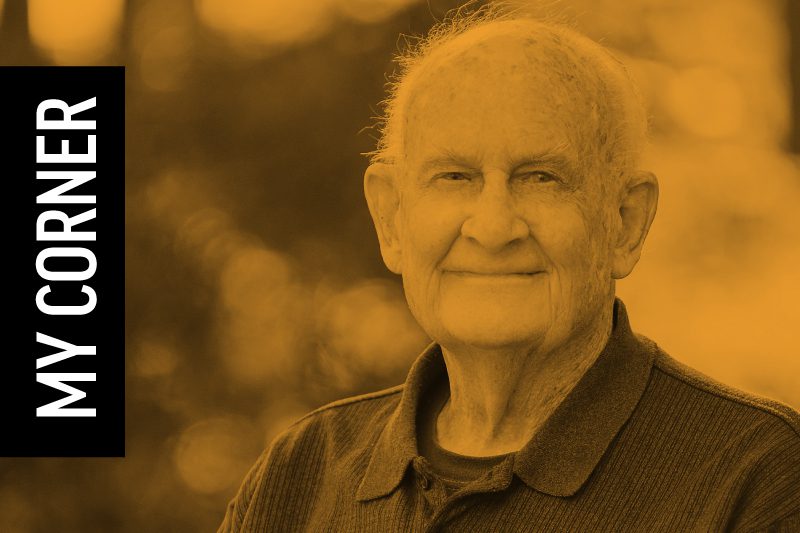A universal truth is that we become like the object of our devotion. If we serve a violent god, we become aggressive. If we are devoted to pleasure, we become hedonistic. However, if we commit to the God of love, dare we believe that we can become more loving? So, we can ask ourselves: What evokes my passion? Where do I spend my time? And, what personality is being fashioned in me as a result?
Denominational personality
Let’s expand the idea a little further. What impact does theology have on a community of faith? What personality evolves from a system of beliefs? It is surely no coincidence that we think of quiet Quakers, loud Pentecostals and peaceful Mennonites. The results of creed do have their impact, it seems. Baptists are renowned for their strong Christian education; Methodists distinguished by hearty singing; Presbyterians characterized by order and Eastern Orthodoxy identified by the mystery of icons. These traits reflect the influence of doctrine. What about your favorite denomination and mine? What is our Salvationist doctrinal personality?
Focused brevity
Our 11 doctrines are terse and efficient. For instance, compared to other denominations—the 39 Westminster Articles of Faith or the 25 Methodist articles of religion—we are notably brief. It is quite certain that in contrast to Reformed doctrine, which was carefully crafted in the scholar’s study of John Calvin, Salvationist doctrine was created, like Wesleyanism, in the passion of revival. No time to ponder theological subtleties here, there are souls to be saved and campaigns to be planned.
Our primary theological text is a “handbook” of doctrine; something to easily reference, not an ecclesiological encyclopedia. The result is denominational pragmatism and a creative space that ecumenical colleagues find disarming.
Classic and orthodox
Our first 5 doctrines form a classic and orthodox foundation. They are broad, strong and uncontentious:
- Scripture, authority
- God, monotheism
- Trinity, classic
- Jesus, incarnation
- Sin, original
A review of any basic theological framework often reveals an identical progression and pattern.
Evangelistic heft
5 of the 11 doctrines feature salvation—the critical mass of our beliefs. No wonder we are called a “salvation people;” as the Founder said, “our speciality.”
From the fanfare of salvation blasted in 6, to the carefully layered explanation outlined in 7 and the inner mystery alluded in 8, no salvation layer is left untouched. 9 brings a dose of reality therapy and gets us moving while 10 unfolds a magnificent horizon almost beyond belief. And so, we have a naturally evangelistic personality, always looking for new ways—in addition to the tried and trusted ways—to get people saved.
Paradox and mystery
The duo holiness doctrines, 9 and 10, counter-balance each other with dynamic tension. “Continued obedient faith in Christ” is filled with discipline and tenacity. “The privilege of all believers to be wholly sanctified” is saturated with grace. While the former sweats, the latter soars. Together they create vibrant tension.
It is the same combined cadence pictured by Winton Marsalis when describing the discipline and freedom of jazz: “In a strange twist…the way that profound things almost always happen, a thing and the opposite of that thing are matched together.” The net effect is what Commissioner Ian Cutmore calls “Muscular Piety”—a truly accurate description of Salvationist spirituality.
Surely we desire that the character of our lives and ministries will be uncluttered and focused, will radiate the greatest news ever told, will incarnate the beauty of holiness, leading many to salvation?
You and I are part of a beautiful movement whose personality aims to dispense with the unnecessary, proclaim the immediacy of grace in Christ and who exhibits a strong, beating evangelistic heart. Yes indeed, this doctrine has personality alright. Now, let’s drill down a little deeper into our holiness doctrine.
Doctrine 10: Everyone holy! Every part holy! Every day holy!
We profess quite radical holiness—available to all believers, for the totality of their being and accessible completely while here on earth.
Doctrine 10 says, “We believe that it is the privilege of all believers to be wholly sanctified, and that their whole spirit and soul and body may be preserved blameless unto the coming of our Lord Jesus Christ.”
So, how is it that such a seemingly innocuous doctrinal statement can be described as radical? Let’s deconstruct the sentence and see what emerges.
Everyone holy: We believe it is the privilege of all believers to be wholly sanctified
“Privilege” is an interesting choice of word, because what comes to mind are the ideas of being “chosen,” “a select few” or those with “greater access and advantages.” However, what makes it intriguing is the run in the same sentence with the word “all,” where the ideas of “everyone,” “equality” and “no differences” come to mind.
We can be justified in asking ourselves, does the word “privilege” contradict the word “all?” Is there tension here? We might say: a “pleasant tension.” What helps is the modifying word “believers”—”all believers.” What we are talking about, this “whole sanctification,” is only available to “believers.” In other words, you have to “believe” in Christ first.
It is surely no coincidence that the coming of the Holy Spirit during Pentecost is a gathering of believers, with that word “all” strongly featured: When the day of Pentecost came, they were all together in one place…All of them were filled with the Holy Spirit (Acts 2:1, 4).
This idea is not to be taken lightly, or ignored, because what we are talking about means that sanctification is not just for religious enthusiasts, or just the gifted, or just the beautiful people, or just the elderly, or just the full-timers or just the clergy.
God forbid, no.
Sanctification is for the believer on the factory floor as well as in the monastery, available to the college student in the dorm, as well as the mystic on the prayer retreat, available to the stay-at-home mom, as well as the seminary professor.
Indeed, there is sufficient evidence from the pages of the New Testament to suggest that the norm of Christian experience is the sanctified life. Paul exhorts, “Be filled with the Spirit” (Eph. 5:18).
Every part holy: their whole spirit and soul and body
People are complex and mysterious, full of intriguing and inter-connected dynamics. Unlike a computer or machine, we cannot be compartmentalized. Contemporary medicine and science fully recognize this.
The Salvation Army is renowned for serving the “whole” person. It is a clear part of who we are and how we contribute to our world. “Soup, Soap and Salvation” is the pithy way our founding parents described it; “holistic ministry” is the technical and missiological term. The “sacrament of the ordinary” is the theological term. In other words, we can say there is a real “holiness” to our body as well as our spirit and our soul. All of us—mind, body and spirit—given over to God.
This is as ancient as the Shema – “Love the Lord your God with all your heart and with all your soul and with all your mind and with all your strength…Love your neighbor as yourself. There is no commandment greater than these.” (Mark 12:30-31 and Deuteronomy 6:5)
This means that we are enabled to see God present even in the most ordinary moments and mundane tasks. It means we can see God’s image in every person, and that often means God is present in quite surprising people and in quite surprising ways. It means that we do not compartmentalize life, sacred and secular, but that work, play and spirituality can be fused into one.
Every day holy: may be preserved blameless unto the coming of our Lord Jesus Christ
Here’s where we get quite explosive! We are convinced that all believers can be holy, blameless, here on earth, right now, every day, all the time, before they go to heaven. We reject the endless sin-repent-confess syndrome and are not satisfied with a “try and do as well as you can” approach. We don’t believe in compromise, the passive acceptance of sin and its twin thinking, that we can only ever be holy in heaven.
Paul prayed for the early church that God would strengthen their hearts so that they would be blameless and holy in the presence of our God and Father when our Lord Jesus comes with all his holy ones (I Thess.3:13). Blameless and holy in readiness for when Jesus returns.
We are not naïve to the power and presence of sin, but, place more emphasis on the availability of grace and the very real availability of divine love. Holiness isn’t just the absence of sin; it is the presence of love, expulsive love.
The experience of holiness has been described as journey and encounter, a dynamic pilgrimage punctuated with face-to-face encounters with Christ. This picture of movement demolishes any notion of holiness being a passive, reclining, inert, lifeless, placid state. Of this we can be confident: He who began a good work in you will carry it on to completion until the day of Christ Jesus (Phillippians 1:6).
Do Good:
- For helpful introductions to praying the Psalms, see Bruce A. Power, “Conversations with God: Psalms as a Resource for Prayer and Meditation” (Toronto: The Salvation Army, 2005) and Walter Brueggemann’s “Praying the Psalms” (Winona, MN: Saint Mary’s Press, 1986).
- For a treatment of preaching in the Salvationist tradition, see “Preaching a Disturbing Gospel” (Toronto: The Salvation Army Canada and Bermuda, 2012) by Julie A. Slous.
- Read The Salvation Army Handbook of Doctrine, which provides the foundational spiritual basis for the work of The Salvation Army
- See how you can get involved in the Fight for Good with The Salvation Army.














